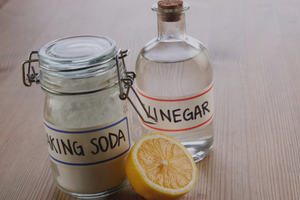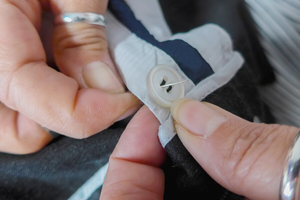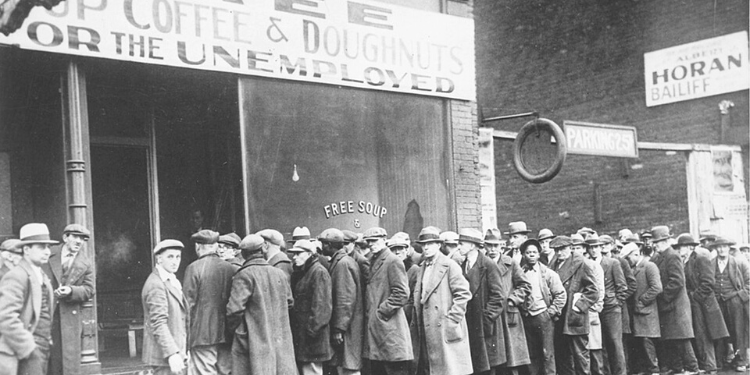The Great Depression was one of the toughest times in United States history. Following a historic collapse of the stock market wages were low, and jobs were tough to find for just about everyone.
However, the saying goes “tough times make tough people”, and the Great Depression was no different. Families, friends, and communities banded together to support one another, and people got savvy with their savings and spending.
To write this article, I spent some time talking with my grandparents who grew up during the Great Depression. In chatting with them I learned some of the tools and tips that they and their families used to save money during this time of economic distress.
I thought it would be helpful to talk with real people who have experience in finding ways to make ends meet when things are tough.
Related: 10 Household Items You Need To Stock Up On Before The Upcoming Great Depression
If we can use and learn from the experiences of those who came before us, then hopefully we are better prepared for the hard times that lay ahead of us.
Here are tips for saving money from real survivors of the Great Depression.
Live As A Family
 While today’s world encourages young adults to move out as soon as possible, it isn’t the best way to save money.
While today’s world encourages young adults to move out as soon as possible, it isn’t the best way to save money.
During the Great Depression families stuck together, and moved together in search of work. Living under one roof cuts down the cost of rent, utilities, food, travel, and more.
By living as a family you can not only save money but have a trustworthy team around you to work through these hard times.
Insulate The Home
Homes today naturally come with some insulation, but the more you can insulate the better. Especially in the colder months of winter keeping the house heated can be challenging and expensive.
Related: Best Ways to Heat Your Off-Grid Home This Winter
My grandmother talked about using whatever they had spare, whether it be clothes, blankets, pillows, etc. Whatever material they had spare was used to try and provide an extra bit of insulation. By adding extra insulation you can find valuable savings on your heating.
Wet Sheets Over Entryways In The Summer
 On the other side of things, during the summers of the Great Depression, they would hang wet or damp sheets over the doors and windows.
On the other side of things, during the summers of the Great Depression, they would hang wet or damp sheets over the doors and windows.
The water would evaporate during the day and in doing so it would cool the air inside the home some.
The less strain you can put on your AC unit means less strain on your wallet.
Buy Produce That Is Close To Spoiling
One tip my grandparents learned that they still practice today is buying produce close to it’s date of expiration. During the Depression, stores were closed on Sunday and the produce being sold would spoil in the upcoming following week.
As such, vendors would drop their prices on Saturday evenings in an attempt to offload all the produce before it went bad.
By purchasing produce on Saturday evenings their families were able to eat for much cheaper the following week.
Create Your Own Cleaning Supplies

Another tip for inside the home is to create your own cleaning supplies. With the adults in the family often taking on daily labor, my grandmother and the other children learned to take up the work around the home.
Related: DIY Wilderness Soap And Shampoo From This Plant
Rather than spending on costly household cleaners from the store, mixing hot water and vinegar can be highly effective for scrubbing away grime.
Consider Cheaper Protein Options
Much of the protein we consume today is either beef or chicken, but during the Great Depression, these types of protein became scarce and expensive. As a result, my grandfather talked about finding cheaper protein options like rabbit, eggs, and even squirrels on occasion.
As kids, one of the my grandfather’s favorite meals was fried bologna because it was cheap and easy to make. Eating meals like these may not be ideal, but it was a way for them to keep an entire family fed on a budget.
Start A Garden
 Vegetables and herbs are great additions to every meal, and herbs in particular were very valuable during the Great Depression as they could add flavor to otherwise bland meals.
Vegetables and herbs are great additions to every meal, and herbs in particular were very valuable during the Great Depression as they could add flavor to otherwise bland meals.
The problem was that purchasing these vegetables and herbs was very costly during that period.
⇒ This Hidden Survival Garden Will Provide An Unlimited Supply Of Food When SHTF
This is is why you should consider starting your own garden. Just as it did back then, gardening can provide you with cheap, continuous, and sustainable access to vegetables and herbs.
Learn How To Bake
On a similar note to gardening, learning to bake was a fun way to save money. Bread can be costly to buy in-store, but it is extremely cheap to make at home.
Even now, my grandmother still enjoys baking from scratch. Along with saving you money on groceries, baking from scratch will probably taste better too.
Make More Soups
During the Depression, soups became extremely popular. They were warm, filling, and most importantly cheap because the main ingredient is water. Almost anything can be made into a soup and it makes great leftovers.
Cut Milk With Water
 A tip that my grandmother used even with her own kids decades after the end of the Great Depression was cutting milk with water.
A tip that my grandmother used even with her own kids decades after the end of the Great Depression was cutting milk with water.
She mentioned that it could be done with other drinks like juices also, but she used to add water to their milk.
By adding water the milk would last significantly longer than it would on it’s own. It may not taste quite as good, but when times are tough every extra penny matters.
Look Into Learning To Sew
When times get tough, it can be very valuable to have some basic sewing skills.
As I mentioned earlier with the adults out working or looking for work, much of the housework fell on the children. This included sewing.

My grandmother learned to sew and patch clothing from her mother and older sisters, and she still uses a sewing machine to this day. This doesn’t mean that you need to buy a sewing machine, but if you can patch up clothes rather than taking them to a tailor or buying something new it can make a huge difference.
Hang Onto Scraps
A valuable lesson many learned during the Great Depression is that everything has value. Whether it is an orange peel or a scrap of fabric from clothing repairs, everything has value.
Related: Food-Stretching Tips From The Great Depression
Peels from citrus fruit can be used in homemade cleaners, and clothing scraps can be used in future repairs. Stockpiling excess supplies and hanging onto scraps can be a very valuable strategy.
Learn To Make Basic Home Repairs
 While often the women would handle cooking, cleaning, and sewing, the men would be responsible for doing repairs around the house.
While often the women would handle cooking, cleaning, and sewing, the men would be responsible for doing repairs around the house.
Everything will break at some point, so if you can learn to fix some of these things on your own it will help you and your family become much more self sufficient.
Moderation Is Key
Moderation can apply to just about anything whether it is food, cleaner, or anything in between. By learning to use everything in moderation you will find that everything you purchase and use lasts significantly longer.
A helpful rule of thumb to remember is “just a dab”. Even to this day, my grandmother always strives to use too little rather than too much of something.
Be Willing To Work
Last but not least, be willing to work, no matter the job. During the Depression, work was scarce, so people had to take on any job they could find.
Even as a child my grandfather would go around the neighborhood looking to find any sort of work available. Whether it was cleaning, running supplies, shoveling manure, or just about anything else, he worked whatever jobs he could find to help support the family.
The economy may not be in as poor of a state as it was during the Great Depression, but that doesn’t mean we can’t learn from those who came before it. These tips from real survivors of the Great Depression are a great way to increase your savings.
You may also like:
 Things You Throw Away That You Should Add To Your Stockpile Instead
Things You Throw Away That You Should Add To Your Stockpile Instead
The ‘Superweed’ That Saved Large Communities During The Great Depression (Video)
Why Now More Than Ever You Should Prepare For the Upcoming EMP















Nobody really needs milk
Oh yea? Tell that one to my Pediatrician.
All very good ideas and suggestions.I remember my folks stories about how hard those times were. My dad was one of
the lucky ones that had a job.
I will say this.Bologna whether is packaged or fresh sliced from
the deli is flat to expensive to buy.
It’s amazing how some of the foods that are so expensive today, were really considered cheap basic staples easy to come by during the Great Depression here on the East Coast. Oysters, fresh salmon come to mind.
If it is protein and available, use it.
My family is from Denmark and they eat pork and fish EVERYDAY.
Most of my aunts and uncles are pushing 100 years and as healthy as can be.
Whoever condemns pork Will likely not not last the long during hard timed⁷7times .
Some good suggestions here, but I’m not sure how practical they are in the modern day. Where I see a lot of people wasting money is with personal care.
If you live in an urban area and are a woman… You have probably found that salons charge a lot of money and if your hair is long like mine, they will charge a premium.
The going rate for a haircut in the city for me is $60… And that doesn’t even include a styling at the end. And then naturally, they are standing there with their hand out for a tip of at least $10 on top of it. Now, before anybody freaks out… Where I live, employees such as waitresses and hairdressers must make the same wage as everyone else. They are not living solely “on tips” as they do in some areas. A lot of them probably actually make more than I do.
Anyway… I can drive out of the city to the closest small town and get the same haircut for $30. I also have a cheap pair of haircutting scissors that I bought from Sally Beauty Supply and unknown to trim my own dry ends between cuts. Same with colors. You can purchase some fairly good quality stuff from the drugstore or from eSalon (they make good quality custom colours and send them to you very cheap). I have noticed that my home colours last just as long on my gray roots as an expensive root job at the salon.
I know several women who seem incapable of cutting their own toenails or filing their own nails. Learn how to do this, it’s not hard. Where I live, a pedicure can cost between $30 and $60 and a manicure can cost about the same… More if you have acrylic nails, which need to be filled every 2 to 3 weeks. and again… the hand out for the tip at the end. You can do this stuff for literally pennies yourself at home.
Make your own bread. Make your own yoghurt. Where I live, a large container of yoghurt is running about $8 or more right now. And most store-bought yoghurt is garbage because it is not fermented long enough to create enough of the bacterial cultures. All you need to do is buy your yoghurt starter one time. After that, you can just use a little bit of your yoghurt or even some of the whey that you have strained off to start another batch (you can freeze whey as well and use it as starter). Dairy products are often put on discount when they are nearing their expiry date. In my experience, dairy products are good for a significant amount of time past that date. If you are lucky enough to find cream/milk discounted – you can make that same size container of yoghurt for around two dollars. And you can ferment it several hours longer so that it actually does contain a very high number of bacterial units. And even if you can’t find dairy on discount… You will still save about 60%.
Learning to cook, not to just to bake, is a key way to save money. When and how to substitute ingredients to still make a nutritious, palatable meal, adds to that value.
Hi there. I’ve already reached the point where I simply cut the end off my ponytail when it gets a bit too long, and have grown my coloured roots out, am sporting silver highlights now – finally accepted it and saved money in the process. Before that I used to dye my hair at home and it was fine, but, I started growing the colour out during the lockdowns, and just stayed with the habit of not colouring, and just snipping my own ponytail off. I’m lucky to have reached the point in life where I don’t care too much about these things, my husband has always preferred natural rather than over-coiffured, so really, nobody else’s opinion matters! I always wear my hair up to keep it off my face while I’m doing things so I never even want to wear it down any more. Strangely, I actually look younger with it up in a pony or bun, even though it has highlights of grey running through it. Anyway, as long as the hair is long enough, it can easily be made into a style which might cover any uneven home hair cutting – for example, a neatly tucked and pinned bun is just fine. I’ve a couple of nice silver and jewel (but subtle) hair accessories which make it look more “posh” for going out. I’ve had one of them for around 24 years and it’s still going strong! Hair will use more soap/shampoo if it grows too long, so getting and keeping the length right that it doesn’t need styling by cutting and is just long enough to make a bun is key for saving money on any product used for washing it too. On my first hair cut during lockdown, I went a bit short and ended up with a shorter ponytail – learned from that mistake. But nobody got to see it anyway as we were stuck at home!
I’ve never paid anyone to do any of my nails in my entire life and I sure won’t start now lol – I don’t use nail polish or fake nails either. I won’t miss any of these salon treatments some women seem to like so much, I’ve never been one for faffing about like that. I often wondered about those women with long nails, how on earth they got any chores done at home and kept their nails intact – some are so long I’m sure they wouldn’t fit in rubber gloves.
It always drove me mad having to sit in the hair salon for so long. Before the pandemic, I used to get a neighbour’s relative to cut my hair as a bit of a favour as she knew us (she worked in a salon, was a proper hairdresser etc), but she let me wash my own hair and she cut it for a huge discount, just £10. She knew I absolutely hated sitting in the salon as I also have mobility problems and sitting there too long I’d start to seize up. I’d wash it at home in the shower, turn up at the salon with it still damp in a ponytail or bun, get it cut and then twist it back up into a bun and leave with it still wet lol – dry it off at home. I can’t think of anything worse than being a spectacle to be gawped at through a salon window while having your hair done. Never understood the pleasure people get from spending hours in those places – it is SO boring!
Very good shout on the food tips there too – I’ve got a yoghurt maker. Talking about dairy products: A lady I know found a bakery at the supermarket had put out large tubs of whipping cream for sale, as the date was nearly up and they wouldn’t use them for the bakery that day. She bought 4 tubs, £1 each, and I believe she said she made about 2 kilos of butter from it that evening for the total of £4 – I cannot remember the size of the tubs she bought unfortunately. The main point is, butter is currently retailing in the UK at £2 for 250g. So 8 packs of butter would have cost her £16. A sharp eye and some elbow grease saved her about £12, and she froze it to preserve it. It pays to keep your eyes open and visit stores nearer the end of the day, for sure, because they’re more likely to have clearance stuff at low prices. Sadly I think we’re in for some competition regarding clearances/sales as people start to feel the pinch. I wish everyone luck in the coming times.
I have had long hair since high school, back in the late 1960’s. On average, I go to a salon for a trim about once every 3 or 4 years. Had to get a trim a few months ago because I lost a lot of hair after recovering from COVID. Yes, that is one of the side effects they don’t tell you about. ?. Anyway, long hair might use more shampoo and conditioner each time you wash it but you can wash it much less frequently than short hair since there is more surface area to take up the natural oils that your scalp produces. A typical 8 ounce tube of shampoo lasts me somewhere between 6 to 8 months, same with the conditioner. I shampoo twice each time I wash my hair, using a less expensive shampoo the first time and a more specialized shampoo for the second. Unless I have been doing some kind of dusty or messy work, I usually wash my hair once every two weeks, sometimes stretching that out to 2 1/2 weeks, depending on my schedule and the weather. I used to work in NYC, where there is lots of pollution in the air, so I always wore my hair up in a bun which helped to protect it and keep it cleaner. Now, I usually wear it in a braided pony tail which also protects it but can fit under or inside a hat, again depending on the weather. I stopped having my hair colored back in 2001 when I moved away from the east coast and the friend who was a professional colorist and did it for $20.
I get pedicures these days, but no polish, just because I am nearsighted with presbyopia and not as limber as I used to be, so I can’t see my toenails very well and can’t get the right angle on them to trim them properly. It isn’t vanity, it is foot health and a pedicure is cheaper than a visit to the podiatrist, especially since there isn’t one in this area.
On sewing – I used to wear flannel nightgowns and pajamas all winter long. Last year, while trying to clean out a bunch of dresser drawers, I pulled out all the old flannel, along with flannel shirts that didn’t fit anymore or had holes in them, and “deconstructed” them. I cut off buttons and put them into a button jar, cut off seams, cuffs and collars, then folded all the pieces that were left and put them into the zippered bags that bedding and pillows come in these days. Now, when I have some free time and a creative bug hits me, I have the fabric necessary to make some quilts. Plus, I have lots of buttons to replace the ones that break or pop off. Freed up a bunch of space and gave me the resources to make something useful from something no longer used.
I am a woman and I spend $0 on my hair and nails. If you are rich I guess you can afford such a luxury but in these hard times I think we need to get real about what is necessary and what is a luxury. If you aren’t 100% debt free and aren’t prepared for emergencies and disasters then I wouldn’t waste my money on such foolishness. I go with having long hair and I don’t worry about manicures or pedicures. I put my money into things that are important such as canning and gardening supplies and equipment.
Very practical good ideals. I’m a veteran living on a fixed income. I have been trying to prepare for any kind of emergency (natural disasters,EMP, home invasion..etc..). The survival tips are very helpful in my quest for self sufficiency. I live in a rural area, so my next project will be a rain water filtration and gathering system. Thank you for all your survival tips.
BTW, thank you for your service to our country!
I’ve got my garden stated already. I have red/yellow/black tomatoes growing and just planted more. I’ve got bell peppers, peppers from seeds a friend of mine gave me. Blackberries, raspberries, blueberries and strawberries and pineapple. Pinto beans are doing just fine.
I think Black Friday and Cyber Monday are going to be extra crazy this year. People are waking up to the fact that times are going to very tough in the near future, and I think they will have one last blow-out holiday season this year. That being said, I would like to see a return to the days when family’s actually did spend quality time together at Thanksgiving, and presents at Christmas were more meaningful and from the heart, instead of being the latest & greatest gadget just to show you are “better than everyone else”.
I remember stories from my parents and grandparents, and how they are more thankful for the memories and family time than any present they ever got. Playing in the fields, traipsing around looking for the perfect Christmas tree, bonding with friends and relatives, enjoying quiet time at home, they had no regrets from the earlier days.
As a kid, I received a present “from the heart”, and I was so disappointed that I did not get the toy I wanted. Christmas is no longer about giving and sharing, and worship; it is more about receiving.. and “damn it, I better get what I want” is the prevailing attitude. I have changed my attitude in my twilight years, and I am still trying to convince the kids and grandkids that memories are better than gadgets.
Thank you for all your suggestions and comments. There is always a Gem or 3 added during these articles… As an ‘Old Fart’ myself, I am familiar with many of these points, but always seem to pick up a new one or two from the readers.
The younger generation have no idea what THANKSGIVING or the CHRISTMAS SEASON is really about. They celebrate Halloween as a really special holiday!! REALLY??!!? Humanity has a real difficult lesson to learn from our SAVIOR JESUS CHRIST!! I’m afraid most won’t pass the test!!!
I pray that you are wrong about them not meeting the test. Rather I pray someone hit them over the head with the TRUTH about the love of our SAVIOR Jesus Christ. He loves and will forgive us all, even forgave me, for my sins. I love him too, but that is NOTHING like His love. Please, spread His gospel?
An investment worth making is peach, Apple, and mulberry trees. Picked up many quart and pint canning jars at yard sales and pressure cookers. Sugar can be made from beets and potatoes go a long way. Buy vinegar while it’s cheap, it won’t spoil. Most importantly, all should be cross trained.
you’ll get an argument about mulberry trees across most of the US – it’s actually a banned tree species for parkway planting for most municipalities – you’d probably have to grow your own saplings – never saw an offering at any nursery ….
What a shame! In Australia walking home from school eating the mulberry tree hanging over the back fence into the laneways is a common experience! They are disappearing as infill happens, but it’s the best bit of summer walks home – stealing the neighbours mulberries!
Keep an eye on vinegar. Like shrink flation the acidity in vinegar is being reduced, make sure it says 5% many today say 3%. I believe that this is deliberate because of the whole “you will own nothing and like it” a few years ago you could find everything to can but lids.Now its the vinegar, anything to increase spoilage. I highly recommend you look around where you reside . I have the following growing on its own wild, thimbleberries, raspberries, blueberries, mullein, st johns wort, wild lettuce, comfrey, borage, yarrow., the list goes on and on and I am under an acre, dont use roundup, promote pollinators, dandelions are the bees first food and a great medicinal plant. So is the accompanying ‘weed’ plantain. There is so much around all of us if you look around. Harvest away from roads and leave some for others. There is an abundance here in the states. Look around
Save those tops of carrots, parsnips, turnips, ect that are cut off and plant them.
When it grows you won’t get the root vegetable but what you will get are the seeds to plant for next planting.
I’ve regrown a fair bit of veggie tops but have never found them much more than a tease.
Have you actually grown tops and actually harvested viable seeds from them?
If so, please explain your system. I overwinter many of my biannual root crops for re-planting in the spring for seed production and am very interested.
Thanks
I feed them to my chickens and Guineafowl. They seem to love them and in return, I get protein in the form of eggs. Seems like a pretty good deal to me.
I was doing some research on getting carrot seeds from my own crop. It takes two years to get a carrot to flower and produce viable seed with desirable characteristics. You need to dig up a carrot without damaging the roots and before the tops get frostbitten, then overwinter it indoors, replant it the next season and, when it flowers, you can save the flower head, let it dry and save the seeds for the next season. If your carrot bolts (flowers) the first season, it will produce carrots that will, like the parent, bolt early and get woody and tough, not good for eating, so there is no point in saving those seeds.
I would like to subscribe
I dont think most understand poverty , like depression
going with out a meal is one thing, but for extended period s of time is another
There is a consequence , the bible states to the 3,4th generation
my parents both lived thru 5 wars and the depression and both know what making the best of what you have is
no money, no store, no things to purchase after it is worn out
and certanly no FOOD
This is the agenda of the Rich, Oligarky of today , mass depression for control
poor are easy to control
if you dont obey , you starve
look at history , real history , not the liars history in the rewritten books in today s schools for making the children dumber , and dumber , that s right so they are just stupid followers
nothing more
must learn now , set up for coming events
Unfortunately, A couple of these suggestions just won’t work in today’s society:
1:Living as a Family:
I have two daughters with children. One has a son living in New Orleans with his dad and is under his spell and will never move back to Oregon. She, herself, has PTSD and lives in a remote area that the family owns, Even though I live semi-rural (about 20 minute drive to a large city), she can’t stand the traffic and lifestyle of city living.
The other daughter also has a young son and can’t leave the SoCa area because of HIS dad, who won’t let him leave (they are also divorced)
So, for the next 10 years at least, she is stuck in SoCa.
2:Buying produce close to spoiling: Although some stores do discount close to or after best buy date, EVERYTHING is open on Sunday, and there really aren’t any specific stores that do it on a daily basis, just catch if you can.
The rest are valid ideas and SHOULD be done by preppers anyway.
I gleaned essential money-saving insights from survivors of the Great Depression, shaping my approach to finances, including navigating investments like ico crypto, ensuring a secure financial future in today’s unpredictable market.
My Grandparents had an abundance of family on either side, almost all went through the great depression and I learned a lot from them growing up. We are a very young nation despite massive technological advances over the time frame of this nation it continued to accelerate. When you compare our nation to others that have been around centuries I think we are closer to our founders and later on our own grandparents I think its easier for us to grow and utilize the raw materials around. Medicinal plants grow everywhere here. Add to what we can grow here with a little help of structure in some locations is a lot. I think there are many many many more people that are prepping than what is realized. I really do
Yes, Saving Money is the best thing in the world. Specially winning a lottery and keeping a secret and living your dream life is the best thing